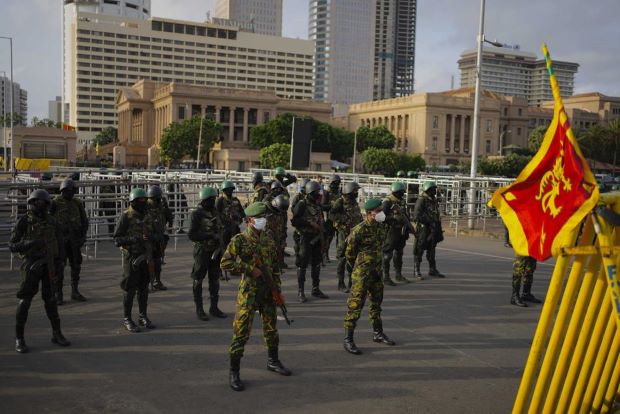Rights groups urge Sri Lanka not to use force on protesters
COLOMBO – International human rights groups have urged Sri Lanka’s new president to immediately order security forces to cease all unlawful use of force against protesters, who have been demonstrating over the country’s economic meltdown.
Armed troops and police arrived in trucks and buses on Friday (22) to clear the main protest camp near the president’s office in the capital, Colombo, a day after President Ranil Wickremesinghe was sworn in.
Even though protesters had announced they would vacate the site voluntarily after staging a sit-in for more than 100 days, the troops moved in and started attacking demonstrators with batons and removing tents and blocks along the roads leading to the President’s House.
Security forces arrested 11 people, including protesters and lawyers. Two journalists and two lawyers were also attacked by soldiers in the crackdown.
Human Rights Watch said the incident “sends a dangerous message to the Sri Lankan people that the new government intends to act through brute force rather than the rule of law”.
“Urgently needed measures to address the economic needs of Sri Lankans demand a government that respects fundamental rights,” Meenakshi Ganguly, South Asia director at Human Rights Watch, said in a statement on Saturday.
“Sri Lanka’s international partners should send the message loud and clear that they can’t support an administration that tramples on the rights of its people,” she added.
Amnesty International also condemned the use of force, saying “it is shameful that the new government resorted to such violent tactics within hours of coming to power”.
“The protesters have a right to demonstrate peacefully. Excessive use of force, intimidation and unlawful arrests seem to be an endlessly repetitive pattern in which the Sri Lankan authorities respond to dissent and peaceful assembly,” said Kyle Ward, the group’s deputy secretary general.
Wickremesinghe, who previously served as prime minister six times, was sworn in as president a week after his predecessor, Gotabaya Rajapaksa, fled the country as protesters stormed his residence. Rajapaksa later resigned while exiled in Singapore.
Sri Lankans have taken to the streets for months to demand their leaders step down to take responsibility for the economic chaos that has left the nation’s 22 million people struggling with shortages of essentials, including medicine, fuel and food.
While the protesters have focused on the Rajapaksa political dynasty, Wickremesinghe also has drawn their ire as a perceived Rajapaksa surrogate.
Al Jazeera’s Minelle Fernandez, reporting from Colombo, said protesters have promised to continue demonstrating until Wickremesinghe resigns.
“Their issue with the new leader is that he has no legitimacy, he has no credibility, given that when the people spoke in the last general elections they voted him out of Parliament,” she said.
With no fuel to buy, public transport has largely ground to a halt in the island nation of 22 million people. Motorists are queueing at petrol stations, sometimes for days, to fill their tanks.
Fernandez said new fuel shipments have reached the country and are being distributed under a rationing system.
“You need to log into a website and log in your information and according to that you are issued a QR code,” Fernandez said. The code is then used at the petrol station to determine how much fuel each vehicle has the right to claim.
The next item on the president’s to-do list will likely be finding a way to bring the budget deficit down and reduce the country’s massive foreign debt, which amounts to about $51bn.
-aljazeera.com/agencies


